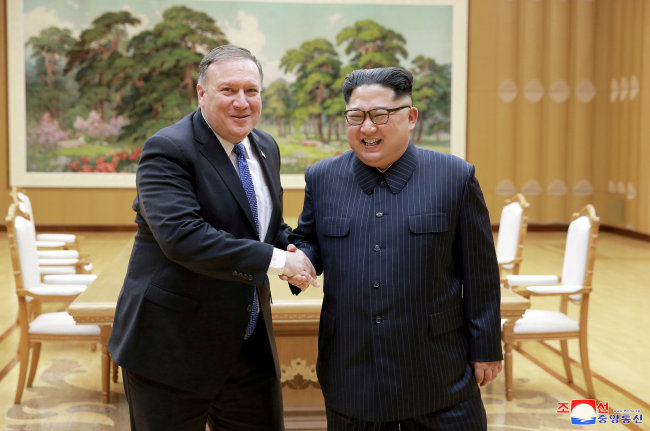US private sector investment in North Korea following complete denuclearization would be a welcome development, a top Cheong Wa Dae official said Monday.
Speaking to reporters on condition of anonymity, a Cheong Wa Dae official said that measures to allow US private sector investment in the North would be the “sooner the better,” in relation to US Secretary of State Mike Pompeo’s television interview.
On Sunday, Pompeo hinted that Washington would allow private sector investment in the North after complete denuclearization.
“This will be Americans coming in — private-sector Americans, not the US taxpayer – private-sector Americans coming in to help build out the energy grid. They need enormous amounts of electricity in North Korea,” Pompeo said in an interview with Fox News.
 |
| US Secretary of State Mike Pompeo and North Korean leader Kim Jong-un during their meeting in Pyongyang on May 9. Yonhap |
Pompeo also suggested a possible role for the US agriculture industry, referring to “the capacity for American agriculture to support North Korea so they can eat meat and have healthy lives,” if Pyongyang complies with its conditions. The US and South Korea demand that the North dismantle its nuclear weapons program, including existing weapons, in complete, verifiable and irreversible manner.
US involvement in developing the North’s infrastructure would fall in line with President Moon Jae-in’s “new economic map of the Korean Peninsula.” The plan was delivered to North Korean leader Kim Jong-un during the April 27 inter-Korean summit.
The plan outlines developing energy and natural resource projects on the east coast, and industry, transport and logistics projects on the west coast of the peninsula, should Pyongyang fully denuclearize. The plan would also see the Demilitarized Zone developed for environmental and tourism-related purposes.
Regarding Pyongyang’s demands for the regime’s security guarantee, the Cheong Wa Dae official said “exchanging a regime guarantee for denuclearization” has been on the agenda from the start.
He added that the regime guarantee goes beyond allowing the Kim Jong-un regime to continue, to normalization of relations with the US and the international community.
On speculations the expression “denuclearization of the Korean Peninsula” may include the US nuclear umbrella and possible deployment of US nuclear assets in the South, he said such issues are the prerogative of the US.
While Pompeo highlights the benefits North Korea stands to receive, US national security adviser John Bolton has been reinforcing Washington’s demands, and the stance that Pyongyang must fully comply before any rewards are given.
In an interview with US broadcaster ABC, Bolton said Pyongyang must get rid of “nuclear weapons, dismantling them, taking them to Oakridge, Tennessee. It means getting rid of the uranium enrichment and plutonium reprocessing capabilities.”
Bolton also said the US will have to have a part in the deconstruction of nuclear weapons.
Bolton has suggested the plan, which follows the Libya model of denuclearization, from early on in his term as national security adviser.
In an interview with Radio Free Asia in March, Bolton said the US should insist that the matter of transporting North Korea’s nuclear program to Oakridge be on the main agenda in a US-North Korea summit.
By Choi He-suk (cheesuk@heraldcorp.com)

